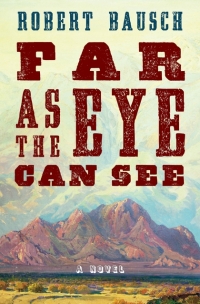Far As the Eye Can See by Robert Bausch
 Wednesday, November 12, 2014 at 8:28AM
Wednesday, November 12, 2014 at 8:28AM 
Published by Bloomsbury USA on November 4, 2014
Far As the Eye Can See is in many respects an old-fashioned western informed by a modern sensibility. It is the story of a decent man living in a time and place that challenges decency. It is the story of a man who finds himself by helping others. It is sad, funny, exciting, and redemptive. This is one of the best westerns I've encountered and one of my favorite reads of 2014.
Bobby Hale (the most recent of many names he has adopted) made it through the Civil War knowing that if he died, nobody would give a lick. With a desire to roam and no desire to work, he hooks up with a wagon train, befriends an Indian named Big Tree, and takes up the life of a hunter and trapper. The story follows Hale on his wander through the West from 1869. His ambition is to live free, enjoy the empty spaces, and avoid death as long as he can. It turns out that life is not so simple.
Hale eventually takes a job as a guide for the Army, which is intent on solving the "Indian problem" -- although as Hale sees it, the problem is with the Army, not the Indians. He also befriends two women who are crossing the country in a wagon pulled by an ox, determined to reach Oregon. All of this (and a good deal more) occupies the first two-thirds of this eventful novel.
The prolog takes place in 1876, when Hale mistakenly shoots a teenage girl called Ink who is running away from her husband. The last third of the novel begins at that point. It leads to one of the most harrowing parts of a life that has been "one long everlasting war." Hale would like to make a different life but the west, and thus his life, is defined by violence. Yet that is not the only definition of life and change, Hale discovers, can come about in unexpected ways.
"There's a million ways to die out here," a character tells Hale, and that's the sense that the novel conveys. Isolated men in the wilderness die by mistake and by design. They die from disease, from bullets, from animal bites, from arrows. Hale is a frequent witness to the death that nature imposes without moral judgment. He also sees death imposed by man: Indians killing whites (usually in defense of their lives or liberty), Army troops slaughtering Indians, lone travelers robbed and hung from trees. He witnesses countless deaths at Little Bighorn. He causes a fair amount of death himself, usually with regret but always with the (sometimes mistaken) belief that he is doing the right thing. There are times when he feels "like ain't nothing under my skin but air, and I can't get enough of that to keep on living."
Robert Bausch writes the first-person narration in an uneducated voice that draws upon nature and experience for its eloquence. It is difficult to make that kind of a voice seem authentic rather than hokey, but Bausch manages the task with great skill. He softens the drama with humor and paints an unbroken landscape that stretches as far as the eye can see, but the novel's power comes from its descriptions of death and survival, humanity and inhumanity.
Hale experiences something like love on more than one occasion as the novel progresses, an emotion that surprises him with its intensity and that he nurtures as an antidote to all the harsh memories that haunt his dreams. At the same time, he can't quite decide what it is he wants (or needs). "It's a tragic kind of world we find ourselves in," he thinks, "all the time looking for some way to have what we want, hoping for nothing but a reason to hope." We make choices based on what we think we want, sometimes without appreciating what we have. Hale wonders if the things we want and for which we hope all just lies that we tell to help us cope with hardship of living. The question for Hale, and for the reader, is whether we can recognize something in life that is worth cherishing, something that makes us more than "a savage animal that can talk."
HIGHLY RECOMMENDED
 TChris |
TChris |  Post a Comment |
Post a Comment |  HR,
HR,  Robert Bausch in
Robert Bausch in  General Fiction
General Fiction
Reader Comments